Thousands of lives are changed forever due to collisions with commercial trucks every year. A commercial truck’s sheer size and weight can transform even a minor traffic incident into a catastrophic event. Families are left to cope with devastating injuries, overwhelming medical bills, and sometimes the unimaginable loss of a loved one.
At Munley Law, we’ve stood beside truck accident victims for over 65 years. Our truck accident lawyers have seen firsthand how these accidents instantly reshape lives, and we’ve dedicated our practice to helping victims rebuild. If you or someone you love has been involved in a truck accident, contact us today for a free consultation.
The Devastating Reality of Commercial Truck Crashes
Commercial truck crashes shatter lives in ways ordinary accidents rarely do. When an 80,000-pound tractor trailer collides with a passenger vehicle, the laws of physics create catastrophic outcomes. The extreme force generated in these crashes subjects the human body to trauma it simply wasn’t designed to withstand. For victims and their families, knowing exactly what type of truck accident occurred not only helps make sense of the tragedy but also illuminates the specific legal pathways toward justice and recovery.
Rollover Truck Accidents
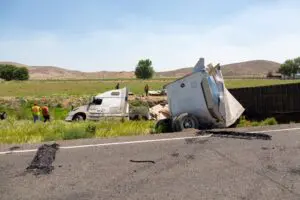 A truck rollover occurs when a truck tips onto its side or roof, often creating a cascade of destruction across multiple lanes of traffic. These accidents frequently involve multiple vehicles and create extended road closures. Common causes of truck rollovers include:
A truck rollover occurs when a truck tips onto its side or roof, often creating a cascade of destruction across multiple lanes of traffic. These accidents frequently involve multiple vehicles and create extended road closures. Common causes of truck rollovers include:
- Excessive speed when navigating curves or ramps
- Improper weight distribution or overloaded cargo
- Sudden steering maneuvers to avoid obstacles
- Driver inexperience or inadequate training
- Defective tires or suspension systems
- High winds affecting high-profile vehicles
When a fully loaded tractor trailer rolls over, it creates a devastating impact zone. Common injuries in rollover accidents:
- Traumatic brain injuries from the violent motion
- Crush injuries occur when vehicles are caught beneath the rolling truck
- Spinal cord damage leading to paralysis
- Multiple bone fractures requiring surgical intervention
- Internal organ damage from blunt force trauma
Rollovers are largely preventable accidents. Trucking companies must implement and enforce strict loading protocols, and drivers need to reduce speed significantly below posted limits when navigating curves, especially in adverse weather conditions.
Jackknife Truck Accidents
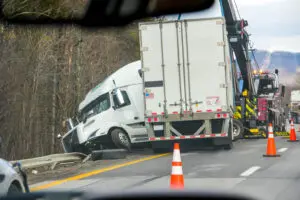 The term “jackknife” describes what happens when a truck’s trailer swings outward, creating a 90-degree angle with the cab that resembles a folding pocket knife. This motion sweeps across multiple lanes, endangering everyone in its path.
The term “jackknife” describes what happens when a truck’s trailer swings outward, creating a 90-degree angle with the cab that resembles a folding pocket knife. This motion sweeps across multiple lanes, endangering everyone in its path.
These accidents often begin with a skid, typically triggered by improper braking. Once the trailer begins to swing, the momentum becomes difficult to control, especially on wet or icy roads. The massive weight of the trailer creates a pendulum effect that even experienced drivers struggle to correct.
Factors that contribute to jackknife accidents are:
- Improper braking techniques (especially sudden braking)
- Driving too fast for the road conditions
- Equipment failures, particularly in the braking system
- Slippery road conditions from rain, ice, or snow
- Empty or lightly loaded trailers (more prone to jackknifing)
- Driver inexperience in handling emergency situations
Typical injuries in jackknife accidents:
- Severe lacerations from metal and glass debris
- Multiple vehicle impact injuries occur when the swinging trailer hits several cars
- Chest trauma from the steering wheel impact
- Traumatic brain injuries from rapid deceleration
- Spinal injuries when vehicles are pushed off roadways
Our experience shows that jackknife accidents often indicate either inadequate driver training or mechanical failures that should have been identified during maintenance inspections. Both scenarios potentially implicate the trucking company in negligence claims.
Underride Truck Accidents
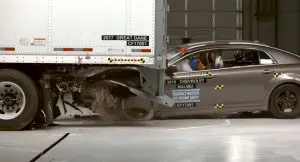
Photo via IIHS
Perhaps the most horrific type of truck accident occurs when a smaller vehicle slides underneath the trailer of a truck. These accidents frequently result in fatal injuries, as the top portion of the passenger vehicle—and everyone inside—makes direct contact with the trailer.
The federal government requires rear underride guards (often called “ICC bumpers”), which are frequently inadequate, damaged, or missing entirely. Even more concerning, federal regulations don’t currently mandate side underride guards, despite their proven effectiveness.
Circumstances leading to underride accidents:
- Inadequate rear or side underride guards
- Poor visibility conditions (fog, rain, nighttime)
- Sudden stops by the truck
- Distracted driving by either party
- Failure to use proper reflective markings on trailers
- Defective brake lights on the trailer
At Munley Law, we’ve advocated for stronger underride guard regulations, based on the devastating injuries we’ve seen these accidents cause. While the trucking industry has resisted these safety improvements, citing costs, we believe human lives should always take precedence over profit margins.
Wide Turn (or “Squeeze”) Truck Accidents
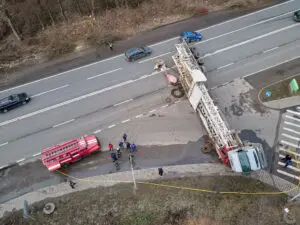 Commercial trucks require significant space to negotiate turns, particularly right turns. Drivers often swing wide to the left to accommodate this need before executing a right turn. This creates a dangerous scenario where passenger vehicles can become trapped between the turning truck and the curb—what’s known in the industry as the “squeeze” zone.
Commercial trucks require significant space to negotiate turns, particularly right turns. Drivers often swing wide to the left to accommodate this need before executing a right turn. This creates a dangerous scenario where passenger vehicles can become trapped between the turning truck and the curb—what’s known in the industry as the “squeeze” zone.
These accidents happen frequently in urban environments where cars, pedestrians, and cyclists share limited space with large commercial vehicles. A typical scenario involves a passenger vehicle attempting to pass a truck on the right, not realizing the truck is about to make a right turn.
How squeeze accidents typically occur:
- The truck fails to signal properly before turning
- A passenger vehicle attempts to pass on the right as the truck turns
- Poor visibility or blind spot issues
- Inadequate driver training for urban environments
- Failure to check mirrors before completing the turn
T-Bone Truck Accidents
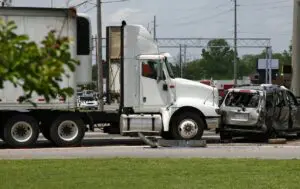 When the front of a truck collides with the side of another vehicle, the resulting “T” shape gives these accidents their name. The side of a passenger vehicle offers minimal protection compared to the front or rear, making these impacts particularly dangerous.
When the front of a truck collides with the side of another vehicle, the resulting “T” shape gives these accidents their name. The side of a passenger vehicle offers minimal protection compared to the front or rear, making these impacts particularly dangerous.
T-bone collisions typically occur when one vehicle fails to yield the right-of-way at intersections. When a commercial truck is involved, the consequences are often catastrophic due to the direct impact on the passenger compartment of the smaller vehicle.
Common causes of T-bone truck accidents:
- Running red lights or stop signs
- Distracted driving causes failure to notice traffic signals
- Fatigued driving impairing judgment
- Brake failures preventing the truck from stopping
- Poor intersection design with inadequate visibility
- Speeding through intersections, making stops impossible
Head-On Truck Collisions
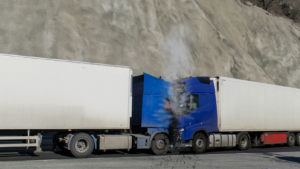 The physics of a head-on collision between a commercial truck and a passenger vehicle creates catastrophic force. These accidents have the highest fatality rate of all truck accident types, and survivors often face life-altering injuries.
The physics of a head-on collision between a commercial truck and a passenger vehicle creates catastrophic force. These accidents have the highest fatality rate of all truck accident types, and survivors often face life-altering injuries.
Head-on collisions typically occur when either vehicle crosses the centerline or median into oncoming traffic. Even at relatively moderate speeds, the combined force of the vehicles traveling in opposite directions creates devastating impacts.
Circumstances that lead to head-on truck collisions:
- Driver fatigue causing lane departure
- Impaired driving (alcohol or drugs)
- Attempting to pass on two-lane roads with insufficient visibility
- Distracted driving (texting, adjusting controls, etc.)
- Mechanical failures such as tire blowouts or steering malfunctions
- Poor road conditions or confusing road markings
Rear-End Truck Collisions
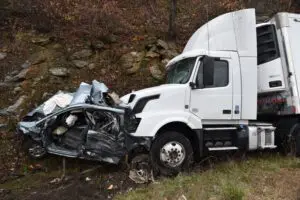 Rear-end collisions can occur in two scenarios: a truck rear-ending a smaller vehicle or a vehicle rear-ending a truck. Both scenarios create unique dangers, though the former typically results in more severe injuries due to the truck’s mass and momentum.
Rear-end collisions can occur in two scenarios: a truck rear-ending a smaller vehicle or a vehicle rear-ending a truck. Both scenarios create unique dangers, though the former typically results in more severe injuries due to the truck’s mass and momentum.
The stopping distance required for a fully loaded tractor trailer can be 40% greater than that needed for a passenger vehicle. This physical reality means truck drivers must maintain greater following distances and remain especially vigilant for traffic slowdowns.
Factors contributing to rear-end truck accidents:
- Following too closely (tailgating)
- Distracted driving preventing timely braking
- Poor weather conditions affecting visibility and stopping distance
- Sudden stops in traffic
- Brake failures or inadequate brake maintenance
- Driver fatigue slowing reaction times
While conventional wisdom often places blame on the rear driver, truck accident cases involve complex liability questions. Factors like mechanical failures, improper signaling, or dangerous lane changes can shift liability to the truck driver or trucking company.
Sideswipe Truck Accidents
When trucks change lanes or drift into adjacent lanes, they can sideswipe vehicles traveling alongside them. The significant size difference means even a “minor” sideswipe by a commercial truck can force smaller vehicles off the road or into other traffic.
Truck blind spots—particularly on the right side—contribute significantly to these accidents. These “no zones” can conceal entire vehicles, making careful mirror checks and signaling essential before changing lanes.
What leads to sideswipe truck accidents:
- Large blind spots (especially on the right side)
- Failure to signal lane changes
- Wind gusts affecting high-profile vehicles
- Driver fatigue or distraction
- Improper merging techniques
- Multiple lane changes without adequate checks
To protect yourself, remember this crucial safety tip: If you cannot see the truck driver in their mirrors, they likely cannot see you. Never linger alongside a commercial truck, especially on the right side.
Take These Critical Steps After a Truck Accident
If you’ve been involved in a truck accident, the actions you take in the immediate aftermath and following days can significantly impact both your physical recovery and your legal rights. Here’s what to do:
Prioritize safety and medical attention Seek immediate medical care, even if injuries seem minor. Many serious injuries like internal bleeding or traumatic brain injuries may not show symptoms immediately. This documentation also creates an essential medical record connecting your injuries to the accident.
Preserve evidence at the scene (if safely possible)
- Take photos of vehicle positions, damage, road conditions, and visible injuries
- Note weather and visibility conditions
- Get contact information from witnesses
- Document the truck’s company name, DOT number, and license plate
Report the truck accident as soon as possible. Call the police to the scene and ensure a report is filed. When available, request a copy of the police report. Don’t forget to report the accident to your insurance company. But remember, only stick to the facts when reporting the accident. Avoid giving recorded statements to any insurance company, and don’t sign anything without your truck accident lawyer reviewing the document first.
Time is critical in truck accident cases, as crucial evidence can disappear quickly, so it’s important to contact Munley Law immediately. Our trucking accident attorneys will:
- Dispatch investigators while evidence is fresh
- Send legal preservation letters to prevent destruction of records
- Begin gathering electronic logging device data and maintenance records
- Interview witnesses before memories fade
- Document the accident scene professionally
Call us for immediate assistance and a free consultation. Remember, you pay nothing unless we win your case.
How Munley Law Can Help You Recover
For over 60 years, the truck accident attorneys at Munley Law have dedicated themselves to securing justice for victims of commercial truck accidents. Our approach combines compassionate client service with aggressive advocacy against powerful trucking and insurance companies.
Our firm brings unique strengths to your truck accident case:
- Deep industry knowledge built over decades of focusing on truck accident litigation
- Board certifications in trucking law and civil trial advocacy
- Proven results, including numerous multi-million dollar verdicts and settlements
- Resources to investigate thoroughly, including relationships with the nation’s leading accident reconstruction experts
- Trial-tested strategies that get results against major trucking companies and their insurers
Don’t face this difficult time alone. If you or a loved one has been injured in any truck accident, contact Munley Law today for a free, no-obligation consultation. We work on a contingency fee basis, meaning you pay nothing unless we win your case.
Reviewed by Bernadine Munley, Esq., Personal Injury Attorney at Munley Law, on September 9, 2025.









